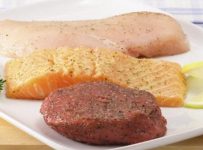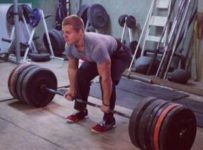CARB BACK LOADING IN 5 SIMPLE STEPS
How to eat, what diet to follow, what supplements to take…all of this seems so complicated. Just trying to figure what is best causes paralysis by analysis in even the most dedicated and willing athletes.
So, let’s keep this simple with a framework anybody can follow. Then, as always, it is up to each athlete to manipulate variables (protein, carbohydrates, fats, specific foods, etc…) to figure out what works best for them.
The basic template for this simple diet plan is John Kiefer’s Carb Back-Loading. He has done a ton of research and all the nitty gritty details are in his manual which you can find HERE.

In very basic terms, on this nutritional plan, you will defer your carbohydrate consumption to the later part of the day, after a good, heavy workout. These carbohydrates eaten in the evening will be more readily assimilated to replenish muscle glycogen and will contribute to the anabolic process better at this time of the day, following a workout with heavy lifting in it.
Thus, the carbohydrates will be less likely to be stored as fat, and will instead be stored as muscle.
The basic goal of this diet plan is to stay lean (minimize fat gain, if any) while increasing muscular size. For many athletes, especially in explosive sports like football, baseball, and wrestling, this is a major goal.
Here is How to Do This
1) Skip breakfast. No fruit, no toast, no juice…Nothing at all. Why skip breakfast? Well, in the morning you wake up from an 8-hour fast (hopefully – get your sleep!) and you are in fat burning mode. This will continue (albeit tapering off as the day continues) UNTIL insulin is elevated naturally, which happens later in the day. At this point, all fat burning stops and fat storage begins. Cereal, pop tarts, donuts, Jamba Juice all crank up the insulin and turn you into a fat storage machine, especially when you eat this first thing in the morning.
“Whatever fears or concerns exist about skipping breakfast, abandon them. I promise that the trepidation is based on anecdote, opinion and, really, what amounts to an old wives’ tale. Having a goal means taking the steps necessary to achieve it and that might mean skipping breakfast, keeping calories light and pigging out at night. And who knows, with one less thing to worry about, it might even be more convenient for those rushing-around-the-house-to-get- ready mornings.” – John Kiefer, author of Carb-Backloading
2) Eat your first meal between 10:30am and noon. Then, any meal or snack during the day PRIOR to your workout, should be made up of animal protein and fat. Green vegetables are freebies too. Some Bulletproof coffee can help suppress appetite in the meanwhile, and can even improve brain function.
3) Around 5 pm (basically later in the day is what we’re looking for here) train. The Explosive Athlete program, or any of the Train Heroic programs for that matter will be just right. Your training primes your muscle cells to receive the carbs that you’ll consume post-workout.
4) Within an hour of finishing your workout, have a meal containing protein and carbohydrates (white rice, sweet potato, plantains, ripe bananas). Don’t worry too much about the amount. Eat well!
“As far as body weight is concerned there’s no real difference between eating calories early in the morning and few at night or vice versa. But checking the difference in body composition tells a very different story. People who eat a big breakfast and start fasting at 7pm lose mostly muscle tissue. People who skip breakfast and eat after 7pm lose body fat and may actually gain muscle. This, dear readers, is fact” – Kiefer
5) If you are trying to bulk up, then repeat this same type of meal (protein and carbs) one more time. If not, you might finish the day with a protein and fat meal.
On days where you do not workout, you can either stick to protein, fat and veggies and no starchy carbs, or you can add a few starchy carbs at night to help provide fuel for the next day’s workout. It depends on your goals. If the main goal is performance and muscle gain, eat some starchy carbs at night even without the heavy workout if a workout is scheduled the following day. If the main goal is minimizing fat and slower muscle gain, skip the carbs on the non-workout days.
That is about as simple as I can make it. Follow this plan and you will get incredible results! Tinker as needed based on your goals.
Note: Some look at Carb Back-Loading as a license to eat crap. Occasionally cheating with sweets is okay after your heavy workout, but this should be the exception to the rule. For more precise details or for a supplement plan with this diet strategy, get Kiefer’s book.







